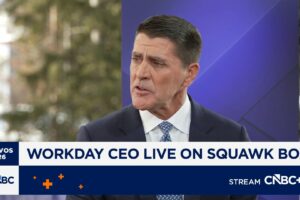There are a lot of factors that could influence Nvidia’s stock price going into 2025.
There is no company that’s benefited more from the artificial intelligence (AI) hype than Nvidia (NVDA 1.69%).
Demand for the company’s graphics processing units (GPU), data center services, and compute unified device architecture (CUDA) software have helped propel the stock by an absurd 900% during the past two years.
Below, I’m going to explore what catalysts I see that could cause Nvidia stock to continue rising while also acknowledging some risk factors that could stymie it. At the end, I’ll reveal my final prediction for where Nvidia stock could be headed in 2025.
What could cause Nvidia stock to go up?
During the past few months, investors gained more insight into the spending plans of many of the technology sector’s largest players. Microsoft, Meta Platforms, Alphabet, Amazon, and Tesla all acknowledged the need for more AI infrastructure.
Rising capital expenditures (capex) from big tech will serve as a tailwind for Nvidia’s compute and networking operation. To be more specific, the company’s Blackwell GPU introduction is poised to be a major bellwether for Nvidia, and I suspect that big tech will be first in line for these new chips.
Nvidia Chief Executive Officer Jensen Huang recently said that demand for Blackwell is “insane,” while Chief Financial Officer Colette Kress said that “in Q4, we expect to get several billion dollars in Blackwell revenue.”
Blackwell production into next year, combined with more planned spending from big tech, should bode well for Nvidia. As a result, I would not be surprised to see Nvidia stock rise in 2025.

Image Source: Getty Images
What could cause Nvidia stock to go down?
One of my biggest trepidations over Nvidia stems from competition. Although each of the mega cap tech companies referenced above are thought to be some of Nvidia’s largest customers, their plans to spend more on AI infrastructure is not all good news for the company.
Many of these tech giants have already started developing their own chips in an effort to move away from their dependence on Nvidia. These moves could have a ripple effect on Nvidia in the form of decelerating revenue and profit growth. As a result, shares of Nvidia could slide.
It’s this particular dynamic that has me curious about why big-name hedge funds such as Ken Griffin’s Citadel and David Shaw’s D. E. Shaw have been trimming their Nvidia positions. Even amid the backdrop of the Blackwell launch, so-called smart money hedge funds seem to be taking profits on Nvidia stock.
I think that part of the selling activity is influenced by the fact that with each passing earnings report, expectations are becoming higher for Nvidia. Gauging the success of the Blackwell launch is pretty subjective. Even if these new GPUs help generate further record growth for Nvidia, investor expectations may be disconnected from reality.
Subsequently, both individual and institutional investors could punish the stock, and Nvidia shares could witness a sharp sell-off.
My prediction for Nvidia’s 2025 price action
I know this may come across like I’m trying to avoid making a firm prediction, but I think Nvidia stock is going to wind up being little changed in 2025. There are several factors that could inspire additional buying and selling of Nvidia stock next year, yet I do not find any of these material enough to cause an annual gain or decline.
What I would be thinking about is if Nvidia stock could rise by another 900% over the next year or even 10 years. In my eyes, I firmly think the answer is “no.” So, although there probably is good money to be made owning Nvidia stock in 2025, I think timing is going to be a big factor here.
However, as a long-term investor, I try to avoid timing stocks and instead look for quality businesses that can post consistent gains over the course of many years.
Can Nvidia continue doing that? Maybe. But for me, I think there’s a good chance that Nvidia stock has peaked, and that it’s best days are entering the rearview mirror.
John Mackey, former CEO of Whole Foods Market, an Amazon subsidiary, is a member of The Motley Fool’s board of directors. Randi Zuckerberg, a former director of market development and spokeswoman for Facebook and sister to Meta Platforms CEO Mark Zuckerberg, is a member of The Motley Fool’s board of directors. Suzanne Frey, an executive at Alphabet, is a member of The Motley Fool’s board of directors. Adam Spatacco has positions in Alphabet, Amazon, Meta Platforms, Microsoft, Nvidia, and Tesla. The Motley Fool has positions in and recommends Alphabet, Amazon, Meta Platforms, Microsoft, Nvidia, and Tesla. The Motley Fool recommends the following options: long January 2026 $395 calls on Microsoft and short January 2026 $405 calls on Microsoft. The Motley Fool has a disclosure policy.













